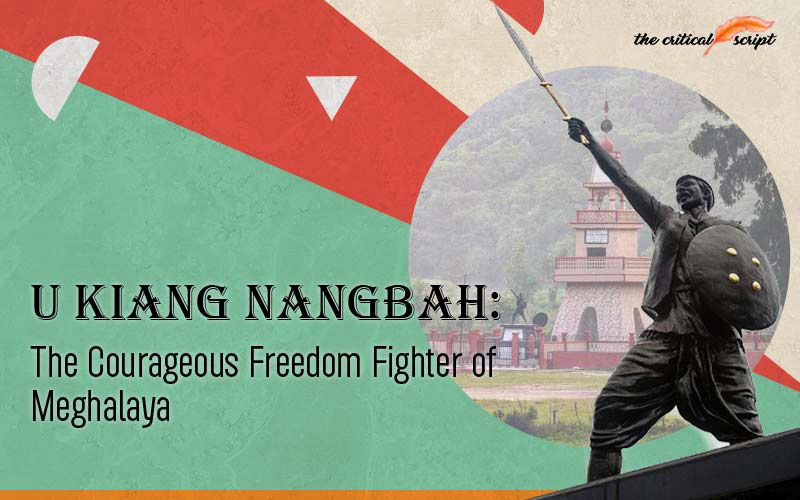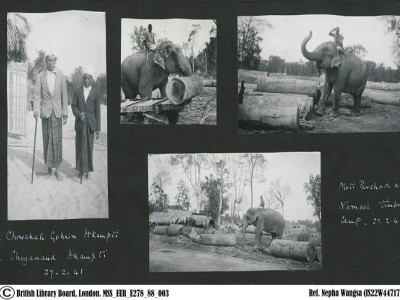
U Kiang Nangbah: The Courageous Freedom Fighter of Meghalaya
U Kiang Nangbah, a revered figure in India’s struggle against British colonialism, is remembered as a symbol of courage, resilience, and patriotism. Born in the mid-19th century in Jowai, in the present-day West Jaintia Hills district of Meghalaya, Kiang Nangbah hailed from the tribal Jaintia community. His life and legacy remain an enduring source of inspiration, particularly for the people of Meghalaya, who view him as a hero who stood firm in the face of colonial oppression.
Early Life and Background
U Kiang Nangbah was born into a modest Jaintia family, deeply rooted in the traditions and customs of the Jaintia Hills. The exact date of his birth remains uncertain, but his formative years were shaped by the rich culture and spiritual practices of his community. The Jaintia Hills, known for their natural beauty and distinct tribal identity, were brought under British control in 1835 following the Anglo-Jaintia War.
The British administration disrupted the traditional way of life for the Jaintia people. Forced taxation, restrictions on their cultural practices, and disregard for tribal autonomy caused widespread resentment. This atmosphere of injustice deeply influenced Kiang Nangbah, instilling in him a sense of duty to protect his community's rights and heritage.
The Rise of Resistance
By the 1860s, British policies had further eroded the socio-economic and cultural fabric of the Jaintia people. The imposition of house tax and other exploitative measures sparked widespread discontent. The colonial government’s disregard for tribal customs and its attempts to convert the people to Christianity added to the growing unrest.
It was during this period that U Kiang Nangbah emerged as a leader. He organized his people to resist British rule, emphasizing the importance of preserving their traditions and reclaiming their autonomy. Nangbah’s leadership was marked by his ability to unite various clans of the Jaintia Hills, rallying them under a common cause.
The Uprising of 1860-1862
The rebellion led by U Kiang Nangbah was a direct response to the injustices imposed by the British. Beginning in 1860, the uprising saw the Jaintia people take up arms against the colonial administration. Nangbah’s strategy combined guerrilla tactics with a deep knowledge of the terrain, enabling his forces to inflict significant damage on British troops.
One notable event during the uprising was the attack on the British outpost in Jowai in 1861, which demonstrated Nangbah’s tactical brilliance. The rebellion soon spread across the Jaintia Hills, with villagers joining the cause in large numbers. Among Nangbah’s key allies were tribal leaders such as U Rangbah Thongni and U Manik Raitong, who provided critical support.
However, the British, under the command of Colonel Richard Haughton, launched a counteroffensive. They used superior weaponry and reinforcements to suppress the rebellion. Despite Nangbah’s best efforts, the resistance was eventually weakened by the British’s scorched-earth policies and the betrayal by local informants.
Capture and Execution
In December 1862, U Kiang Nangbah was betrayed by an informant and captured by the British. Despite his imprisonment, Nangbah remained defiant and refused to bow to colonial authority. He was tried and sentenced to death.
On December 30, 1862, U Kiang Nangbah was publicly hanged in Jowai. Before his execution, he is believed to have uttered the prophetic words: “If my face turns eastward when I die, my country will be free; if it turns westward, it will remain enslaved.” According to local accounts, his face did indeed turn eastward, symbolizing hope and liberation for his people.
Legacy
U Kiang Nangbah’s sacrifice left an indelible mark on the history of Meghalaya and India’s freedom struggle. Though his rebellion was ultimately quelled, it inspired future generations to resist colonial oppression. His unwavering commitment to his people’s rights and culture continues to be celebrated through songs, stories, and commemorative events in Meghalaya.
The Government of India honored his legacy by issuing a postage stamp featuring U Kiang Nangbah in 2001. Monuments and institutions across Meghalaya bear his name, including the Kiang Nangbah Government College in Jowai. Additionally, December 30 is observed as U Kiang Nangbah Day in Meghalaya to commemorate his martyrdom.
U Kiang Nangbah’s life is a testament to the spirit of resistance and the importance of standing up against injustice. His legacy resonates with the people of Meghalaya and with all those who value freedom and cultural preservation. As a true son of the soil, U Kiang Nangbah’s story continues to inspire a sense of pride and determination to uphold the ideals he gave his life.
Disclaimer: The opinions expressed in this article are those of the author's. They do not purport to reflect the opinions or views of The Critical Script or its editor.

Newsletter!!!
Subscribe to our weekly Newsletter and stay tuned.

















Related Comments